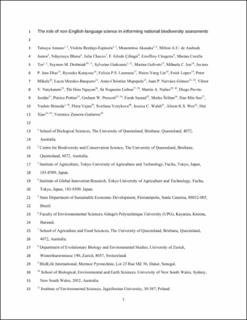| dc.contributor.author | Amano, Tatsuya | |
| dc.contributor.author | Berdejo-Espinola, Violeta | |
| dc.contributor.author | Akasaka, Munemitsu | |
| dc.contributor.author | de Andrade Junior, Milton | |
| dc.contributor.author | Blaise, Ndayizeye | |
| dc.contributor.author | Citegetse, Geoffroy | |
| dc.contributor.author | Checco, Julia | |
| dc.contributor.author | Çilingir, F.Gözde | |
| dc.contributor.author | Tor, Marina Corella | |
| dc.contributor.author | Drobniak, Szymon M. | |
| dc.contributor.author | Giakoumi, Sylvaine | |
| dc.contributor.author | Golivets, Marina | |
| dc.contributor.author | Ion, Mihaela C. | |
| dc.contributor.author | Jara-Díaz, Javiera P. | |
| dc.contributor.author | Katayose, Ryosuke | |
| dc.contributor.author | Lasmana, Felicia P.S. | |
| dc.contributor.author | Lin, Hsien-Yung | |
| dc.contributor.author | Lopez, Erick | |
| dc.contributor.author | Mikula, Peter | |
| dc.contributor.author | Morales-Barquero, Lucia | |
| dc.contributor.author | Mupepele, Anne-Christine | |
| dc.contributor.author | Narváez-Gómez, Juan P. | |
| dc.contributor.author | Nguyen, Thi Hieu | |
| dc.contributor.author | Nogueira Lisboa, Sa | |
| dc.contributor.author | Nuñez, Martin A. | |
| dc.contributor.author | Pavòn-Jordàn, Diego | |
| dc.contributor.author | Pottier, Patrice | |
| dc.contributor.author | Prescott, Graham W. | |
| dc.contributor.author | Samad, Farahd | |
| dc.contributor.author | Šćiban, Marko | |
| dc.contributor.author | Seo, Hae-Min | |
| dc.contributor.author | Shinoda, Yushin | |
| dc.contributor.author | Vajna, Flóra | |
| dc.contributor.author | Vozykova, Svetlana | |
| dc.contributor.author | Walsh, Jessica C. | |
| dc.contributor.author | Wee, Alison K.S. | |
| dc.contributor.author | Xiao, Hui | |
| dc.contributor.author | Zamora-Gutierrez, Veronica | |
| dc.date.accessioned | 2023-08-29T11:14:12Z | |
| dc.date.available | 2023-08-29T11:14:12Z | |
| dc.date.created | 2022-10-27T14:32:19Z | |
| dc.date.issued | 2023 | |
| dc.identifier.issn | 2398-9629 | |
| dc.identifier.uri | https://hdl.handle.net/11250/3086179 | |
| dc.description.abstract | Consulting the best available evidence is key to successful conservation decision-making. While much scientific evidence on conservation continues to be published in non-English languages, a poor understanding of how non-English-language science contributes to conservation decision-making is causing global assessments and studies to practically ignore non-English-language literature. By investigating the use of scientific literature in biodiversity assessment reports across 37 countries/territories, we have uncovered the established role of non-English-language literature as a major source of information locally. On average, non-English-language literature constituted 65% of the references cited, and these were recognized as relevant knowledge sources by 75% of report authors. This means that by ignoring non-English-language science, international assessments may overlook important information on local and/or regional biodiversity. Furthermore, a quarter of the authors acknowledged the struggles of understanding English-language literature. This points to the need to aid the use of English-language literature in domestic decision-making, for example, by providing non-English-language abstracts or improving and/or implementing machine translation. | en_US |
| dc.language.iso | eng | en_US |
| dc.relation.uri | https://www.nature.com/articles/s41893-023-01087-8 | |
| dc.rights | Navngivelse 4.0 Internasjonal | * |
| dc.rights.uri | http://creativecommons.org/licenses/by/4.0/deed.no | * |
| dc.subject | Bevaringsbiologi | en_US |
| dc.subject | Conservation biology | en_US |
| dc.title | The role of non-English-language science in informing national biodiversity assessments | en_US |
| dc.title.alternative | The role of non-English-language science in informing national biodiversity assessments | en_US |
| dc.type | Peer reviewed | en_US |
| dc.type | Journal article | en_US |
| dc.description.version | acceptedVersion | en_US |
| dc.subject.nsi | VDP::Språkvitenskapelige fag: 010 | en_US |
| dc.subject.nsi | VDP::Linguistics: 010 | en_US |
| dc.subject.nsi | VDP::Språkvitenskapelige fag: 010 | en_US |
| dc.subject.nsi | VDP::Linguistics: 010 | en_US |
| dc.source.pagenumber | 845-854 | en_US |
| dc.source.volume | 6 | en_US |
| dc.source.journal | Nature Sustainability | en_US |
| dc.identifier.doi | 10.1038/s41893-023-01087-8 | |
| dc.identifier.cristin | 2065672 | |
| dc.relation.project | Andre: Australian Research Council Future Fellowship (FT180100354) | en_US |
| dc.relation.project | Andre: University of Queensland | en_US |
| dc.relation.project | Andre: Swiss National Science Foundation | en_US |
| dc.relation.project | Andre: Coordenação de Aperfeiçoamento de Pessoal de Nível Superior | en_US |
| cristin.ispublished | true | |
| cristin.fulltext | postprint | |
| cristin.fulltext | postprint | |
| cristin.qualitycode | 1 | |

